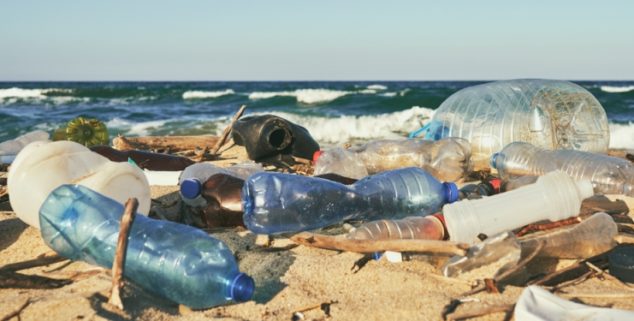Opinion
Let’s get plastic out of our food — now
 Plastic garbage on the beach, tossed there or brought in by the tide. (Photo: Larina Marina, via Shutterstock)
Plastic garbage on the beach, tossed there or brought in by the tide. (Photo: Larina Marina, via Shutterstock)You’ve probably heard the phrase, “You are what you eat” a thousand times. It’s a motto usually used to encourage skipping the fries or chips for the recommended servings of veggies and fruits. But lately this phrase has a taken on an alarming new meaning.
We are eating plastic. We are exposed to microplastics and the chemicals that leach out from our food packaging in alarming amounts. The one true solution to this problem is stopping plastic at the source, which two bills in the California Legislature — Senate Bill 54 and Assembly Bill 1080 —are attempting to do.
Plastics break down into smaller and smaller pieces, acting as magnets for harmful pollutants that make their way into the food chain.
A recent finding estimates that an average person could be ingesting approximately 5 grams of plastic every week — that’s equivalent to the weight of one credit card!Tests of honey, salt, seafood and even beer have detected the presence of microplastics. While the impacts of plastic exposure to public health is an emerging field of understanding, we know enough to realize the repercussions could be significant and not worth the risk.
And we’re not alone in this plastic buffet. Hundreds of species of ocean animals are ingesting incredible amounts of microplastics. Synthetic particles, including microplastics, have been observed in the guts of all seven species of the ocean’s sea turtles. Recent headlines of a beached whale carrying 88 pounds of plastic in its stomach were unavoidable. Microscopic plastic pieces have even been reported in the ocean’s tiniest plankton—organisms that contribute toward at least half of the air we breathe.
These pervasive plastic particles have been found from the deepest parts of the ocean — including Monterey Bay, with its underwater canyon deeper than the depths of the Grand Canyon—to the most remote areas in the Arctic’s melting sea ice.
Plastics never go away. Instead, they break down into smaller and smaller pieces, acting as magnets for harmful pollutants that make their way into the food chain. Plastics also release greenhouse gases as they break down with the sun’s exposure. Anestimated 17.6 billion pounds of this everlasting material enters the marine environment every year. Simply put, plastics are flooding our environment.
We need urgent, bold action to stop this flood of plastic.
California is taking a step in the right direction via Senate Bill 54 and Assembly Bill 1080. These proposed pieces of legislation aimby 2030 to reduce by 75% all single-use packaging and the top 10 single-use plastic products most collected at statewide beach cleanups. Methods of reducing by 75% include source reduction, recycling or composting.
For products that are continued to be made in single-use form, they must be made with compostable or truly recyclable materials. The bills also call for higher recycling rates, which would take us from California’s meager 15% recycling rate to 75%, with the intent to create more business and job opportunities by ensuring more recycling happens within state lines.
In order to put a meaningful dent in the plastic pollution crisis, we need to ensure quantifiable limits on the amount of plastic being produced — otherwise it will continue to have a massive impact on our oceans, our soil, our air and our own health.In terms of driving reduction in corporate plastic production, this is an excellent place to start. We don’t have time on our side. We need urgent, bold action to stop this flood of plastic— and SB 54 and AB 1080 are offering the most comprehensive single-use plastics policy in the nation.Both bills must pass the Senate and Assembly by September 13 in order to be considered by Gov. Newsom for his signature into law.
As the fifth-largest economy in the world, the state of California has an opportunity to turn the tide on its contribution of single-use plastic waste. Let’s continue to lead the nation in progressive environmental reform and do what’s needed to reverse this crisis before it’s too late.
—
Editor’s Note: Ashley Blacow-Draeger is Pacific policy and communications manager for Oceana.
Want to see more stories like this? Sign up for The Roundup, the free daily newsletter about California politics from the editors of Capitol Weekly. Stay up to date on the news you need to know.
Sign up below, then look for a confirmation email in your inbox.

Leave a Reply